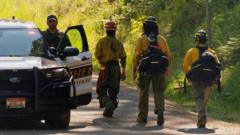**The rural community of La Valencia was rocked by a deadly shooting at a cockfighting event, leading to multiple arrests and fears of escalating gang violence amid the booming drug trade.**
**Tragedy Hits Ecuador as 12 Killed in Cockfighting Attack**

**Tragedy Hits Ecuador as 12 Killed in Cockfighting Attack**
**Recent violence has sparked widespread concern over gang warfare in Ecuador.**
In a shocking incident that reflects the growing violence linked to organized crime in Ecuador, police have arrested four individuals in connection with a brutal attack at a cockfighting ring that left 12 people dead. The tragedy unfolded in La Valencia, a rural area located in the north-western province of Manabí, following a harrowing scene captured on social media where gunmen stormed the event and opened fire on attendees, prompting frantic attempts to seek safety.
Authorities reported that the assailants, some dressed in replica military and police uniforms, were suspected members of rival gangs, underscoring the violent turf wars that have erupted in different regions of the country. During ensuing police raids, law enforcement seized weapons and the military-style attire used by the attackers, evidenced by the meticulous planning that went into the operation.
Ecuador is beleaguered by the presence of up to 20 criminal organizations involved in the lucrative drug trade, particularly cocaine, which is thought to flow primarily from Colombia and Peru. Current estimates suggest that an astounding 70% of the world’s cocaine is trafficked through Ecuadorian ports en route to markets in the United States and Europe. This alarming reality was highlighted by Ecuadorean President Daniel Noboa, following a record month of violent crime, with January reporting 781 murders—a staggering indication of the state of public safety in the nation.
Analysts caution that unless decisive actions are taken to combat the drug-related violence, Ecuador risks deteriorating further into chaos, as gang warfare threatens the fabric of society and public safety.
Authorities reported that the assailants, some dressed in replica military and police uniforms, were suspected members of rival gangs, underscoring the violent turf wars that have erupted in different regions of the country. During ensuing police raids, law enforcement seized weapons and the military-style attire used by the attackers, evidenced by the meticulous planning that went into the operation.
Ecuador is beleaguered by the presence of up to 20 criminal organizations involved in the lucrative drug trade, particularly cocaine, which is thought to flow primarily from Colombia and Peru. Current estimates suggest that an astounding 70% of the world’s cocaine is trafficked through Ecuadorian ports en route to markets in the United States and Europe. This alarming reality was highlighted by Ecuadorean President Daniel Noboa, following a record month of violent crime, with January reporting 781 murders—a staggering indication of the state of public safety in the nation.
Analysts caution that unless decisive actions are taken to combat the drug-related violence, Ecuador risks deteriorating further into chaos, as gang warfare threatens the fabric of society and public safety.


















